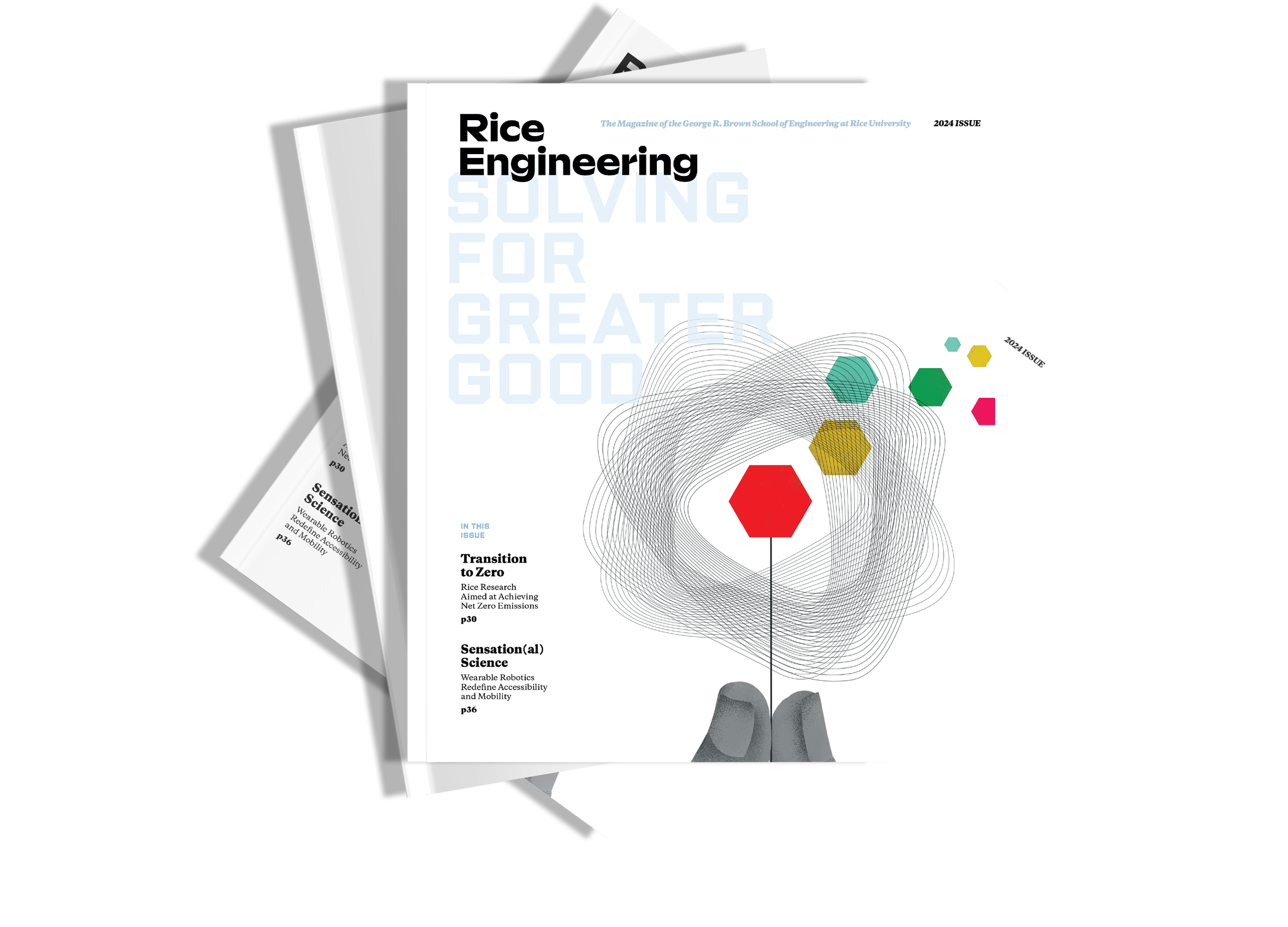
The spring 2024 issue of Rice Engineering Magazine is here!
At Rice Engineering, we are driven by a passion for innovation and a commitment to responsible engineering practices. It’s with great excitement that we unveil the new design of Rice Engineering magazine, which underscores our dedication to excellence in research, education, and service. The 2023-24 issue is full of news about how Rice Engineering is solving for greater good.
Rice and Woodside Energy establish technology partnership
to address climate change

Reginald Desroches, Rice President
Rice University and Woodside Energy have formed a five-year “speed and scale” collaboration aimed at developing cold plasma technology to transform greenhouse gases (carbon dioxide and methane) into solid carbon for batteries, transistors and other materials for energy transition technologies.
Woodside provided $12.5 million to create the Woodside-Rice Decarbonization Accelerator to bring innovative decarbonization technology from Rice labs to market. The university’s efforts will be spearheaded by REINVENTS (Rice Engineering INitiatiVe for ENergy Transition and Sustainability) and the Nexus (Rice Innovation scale-up facility in the Ion District), both launched in 2023.
“This collaboration is a testament to the power of merging academic expertise with industry insight and support. Together, we aspire to redefine the future of energy and climate,” said Rice President Reginald DesRoches.
“The Woodside-Rice Decarbonization Accelerator epitomizes what REINVENTS is all about, namely bringing engineering researchers together to solve big energy problems and translate these solutions into market products,” said Luay Nakhleh, William and Stephanie Sick Dean of Engineering.
The accelerator brings together decades of expertise in the synthesis and processing of carbon materials at Rice. The faculty leaders of the initiative have all incubated and developed start-up companies based on the technologies in their lab and understand the scaling-up processes required to go from proof-of-concept to a product. The principal investigators leading the accelerator are:
Paul Cherukuri, vice president for innovation and chief innovation officer and associate research professor of electrical and computer engineering (ECE); Aditya Mohite, associate professor of chemical and biomolecular engineering and of materials science and nanoengineering (MSNE), director of REINVENTS; Pulickel Ajayan, Benjamin M. and Mary Greenwood Anderson Professor of Engineering and department chair of MSNE; Naomi Halas, University Professor and director of the Laboratory for Nanophotonics; Peter Nordlander, Wiess Chair and Professor of Physics and Astronomy, professor of ECE and of MSNE; and Bruce Weisman, professor of chemistry and of MSNE.
Woodside executive vice president of technical services Daniel Kalms emphasized the significance of the new collaboration being based in Houston. “Houston, as the world’s energy capital, is positioned to help develop the technologies needed for the energy transition. This collaboration is a great fit with Woodside as a leading global energy company,” Kalms said.
Mission to reduce newborn deaths in Africa advances with $65M

The Newborn Essential Solutions and Technologies (NEST360) alliance has launched phase 2 of its mission to reduce newborn mortality in sub-Saharan Africa with $65 million in funding from the Bill & Melinda Gates Foundation, the Children’s Investment Fund Foundation, The ELMA Foundation and individual contributions.
Founded in 2017, the 10-year effort to save the lives of 500,000 African babies each year is aligned with the United Nations’ 2030 Sustainable Development Goals, specifically by limiting newborn deaths to no more than 12 per 1,000 live births by 2030.
Of the estimated 2.3 million newborns who die each year around the globe, African countries have the highest rates of mortality. African newborns have almost 10 times the risk of neonatal death compared to babies born in Europe or the U.S. Adequate medical care could ensure the survival of 75% of the estimated 1.1 million African newborns who die each year.
“NEST360 is an international alliance of clinical, biomedical, and public health experts from 22 institutions and organizations,” said co-founder Rebecca Richards-Kortum, Malcolm Gillis University Professor and professor of bioengineering at Rice. “Improving quality for small and sick newborn care in NEST360-implementing countries and beyond requires a systems-change approach that cuts across all levels of care.
“This includes addressing multiple clinical needs of the individual patient; ensuring the design, availability and maintenance of equipment and sufficient clinical and biomedical staff; and implementing policies to support overall care.”
This second five-year phase will build on the progress achieved in Malawi, Tanzania, Kenya and Nigeria from 2019 to 2023, where the alliance, in partnership with the countries’ governments, improved the quality of care for some 100,000 babies admitted each year to the 67 hospitals implementing NEST360.
Rice WaTER Institute to develop accessible clean water technology

Rice has launched the Water Technologies Entrepreneurship and Research (WaTER) Institute to address complex water-related challenges around the globe. “Clean water can save more lives than doctors,” said Pedro J. Alvarez, WaTER’s director and the George R. Brown Professor of Civil and Environmental Engineering. Its researchers will predict and prevent diseases by monitoring wastewater; decrease the amount of energy used to treat water in large municipal water systems; predict water-related natural disasters; extract high-value metals with high energy efficiency and low water consumption, and more.
